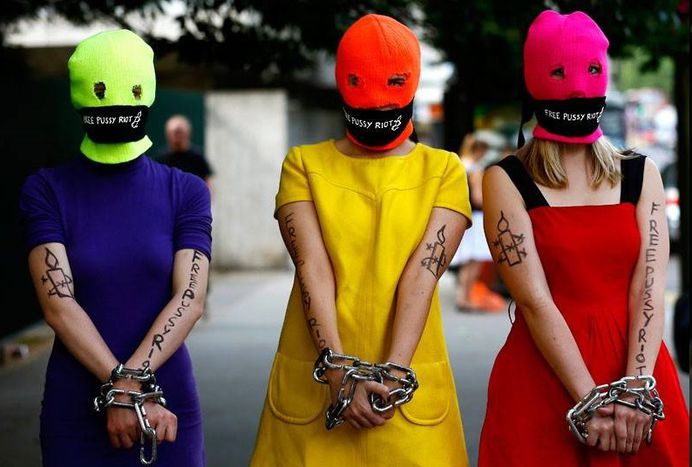
Andrei Yerofeyev: 'Pussy Riot’s campaign blew up the usual performance setting for artists'
Published on
Translation by:
 Sarah Hole
Sarah Hole
The well-known modern art curator was convicted in 2010 for an exhibition that criticised religion. According to Yerofeyev, the trio's two-year prison sentence hides the intention to divide the most important forces in society: the church and modern culture. Interview
Andrei, two years ago you were on trial in Moscow for your ‘Forbidden Art’ exhibition and for 'incitement to religious hatred'. The prosecutor believes that you should also go to a prison colony for three years. Does the Pussy Riot ruling feel like déjà-vu to you?
Andrei Yerofeyev: No. I actually feel that the trial against myself and Yuri Samodorov was a test where all the methods that are now being used were tried out. At the time, even the ‘victims’, whose statements had been dictated by the investigator, testified against us. They declared in court that their religious feelings had been hurt, and this claim needed no more evidence before the court. In the Pussy Riot case, we have once again seen expert reports that cannot be taken seriously in court.
At the time you claimed that the Kremlin administration was behind the trial against you. The same is now being said for the Pussy Riot case. What does the Kremlin gain from that?
Andrei Yerofeyev: On the one hand, this type of lawsuit is used as revenge against specific people, but the significance goes even deeper. Vladislav Surkov - this Machiavellian puppet-master in the Kremlin who has only just been appointed as the chief of relations with the church - uses trials like these to let the two most powerful spiritual and creative forces of the post-soviet era, the (Russian orthodox) church and modern culture, collide.
How does Surkov benefit from it?
Andrei Yerofeyev: It means that the regime succeeds in dividing the two most important forces in society. At the time of perestroika, the church and modern culture were much closer to each other. But in the past decade, the church has replaced the communist party of the Soviet Union, and it now symbolises the reactionary core of our society. It fosters resentment towards the west and towards modern man in general.
Read 'Top five Russian political music videos' on cafebabel.com
This transformation is a direct result of the collision that has been steered from above. Surkov is a very cynical person in all this: he supports both the church and contemporary artists such as Marat Gelman so that they then stir each other up. The result is a deep divide in society, which didn’t exist in the 1990s.
Yet the church has also been experiencing headwinds recently...
Andrei Yerofeyev: Of course. The other side of the coin is a wave of anti-clericalism, particularly against Patriarch Kirill and his extravagant lifestyle. There have been several scandals recently, firstly because of an expensive watch belonging to the patriarch, then because of his huge apartment in the centre of Moscow.
What do you have to say about the verdict on the three young women members of Pussy Riot?
Andrei Yerofeyev: When the verdict was passed on us, Dmitry Medvedev was in power and he had a number of sane advisers. Now the president is Vladimir Putin, and this whole trial only allows one conclusion: the Kremlin wants to show itself to be as inhumane as possible.
But can the Kremlin be indifferent to the harsh criticism from abroad?
Andrei Yerofeyev: In these types of trials, the Kremlin shows that it is in fact completely indifferent to criticism from abroad. Putin enjoys playing the bad boy – he likes the role. And this almost sadistic motivation is what marks out the current regime from Brezhnev’s frail one: that regime made mistakes because it was weakened by age. The current regime shows that it has reached the highest level of cynicism and egoism.
What can be the response to this?
Andrei Yerofeyev: There must be an ethical alternative from the opposition – an alternative to this cynicism and egoism. I can see these efforts in Pussy Riot’s campaign: the young women wanted to show how unethical the close relationship between the church and the Kremlin is.
Didn’t you divide society even more with your campaign?
Andrei Yerofeyev: The regime is alarmed by Pussy Riot’s campaign because it blew up the usual performance setting for artists: three young women call on the mother of god on behalf of the people to chase out Putin. Several million people watched the thirty-second video within a few weeks. If you now enter 'mother of God' into a search engine, the first thing that appears is 'Chase Putin out'. Art has not had this effect in Russia for a long time! Pussy Riot left the space of art and invaded the church’s space. And even breaking down these space boundaries was provoked by the church and the state.
You were fined in 2010. Has the verdict had other consequences for you?
Andrei Yerofeyev: Of course. It means I have a criminal record and so I’m an outcast of sorts. Official Russian institutions don’t want anything to do with me anymore.
The author of this interview, Moritz Gathmann, is a member of the Berlin-based German writers network n-ost
Images: © freights for lunch/ flickr/ video: (cc) CNN/ youtube
Translated from Pussy Riot: Putins höchste Stufe des Zynismus


